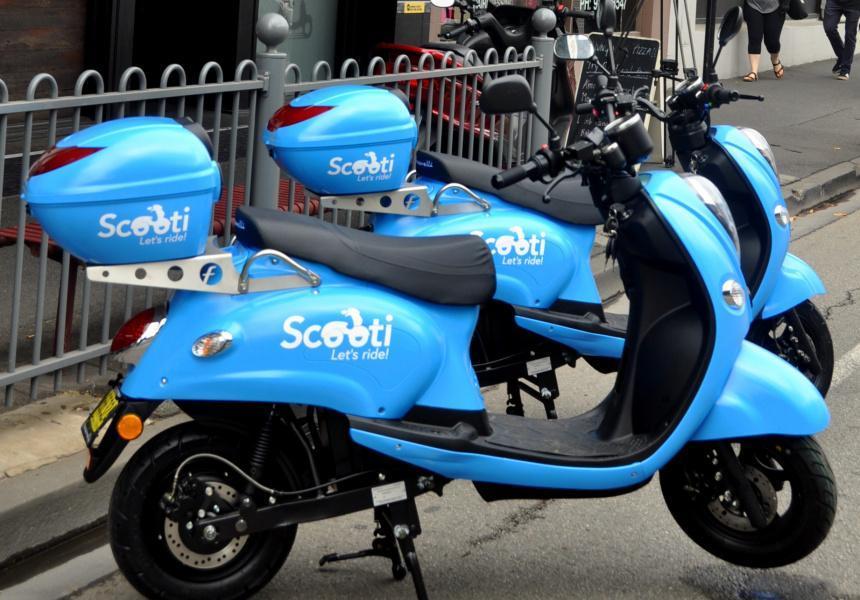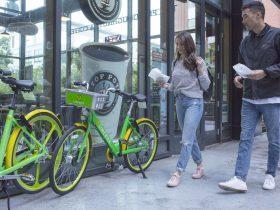By Greta Brereton
Scooti is a new ride-sharing service coming to Melbourne this April. Its point of difference in a crowded market? Passengers will be getting around on two wheels instead of four – the service uses scooters instead of cars.
CEO Cameron Nadi describes himself as a motoring enthusiast, and has been riding bikes since his teens. He was inspired by ride-sharing services like Go-Jek in Southeast Asia (which also focuses on scooters), and believes Scooti will bring a sense of adventure to his customer’s commute.
“More and more Australians are going to Southeast Asia, to Europe, for holidays and getting on the back of scooters and loving it. So we’re bringing that here, we’re making errands an adventure.
Scooti is a new ride-sharing service coming to Melbourne this April. Its point of difference in a crowded market? Passengers will be getting around on two wheels instead of four – the service uses scooters instead of cars.
CEO Cameron Nadi describes himself as a motoring enthusiast, and has been riding bikes since his teens. He was inspired by ride-sharing services like Go-Jek in Southeast Asia (which also focuses on scooters), and believes Scooti will bring a sense of adventure to his customer’s commute.
“More and more Australians are going to Southeast Asia, to Europe, for holidays and getting on the back of scooters and loving it. So we’re bringing that here, we’re making errands an adventure.
“We want the best scooter drivers who are passionate about scooter culture, and who really want to … help commuters get to their destinations a lot quicker,” he says.
In 2015 lane filtering was legalised in Victoria, enabling motorcyclists to ride between lanes of traffic at a speed of 30km/h or less, when safe to do so. Nadi plans on taking advantage of the rule change with Scooti.
“We’re saving significant time, when you’ve got that stand-still traffic that everyone dreads, scooters can just slice right through,” he says.
In 2015 lane filtering was legalised in Victoria, enabling motorcyclists to ride between lanes of traffic at a speed of 30km/h or less, when safe to do so. Nadi plans on taking advantage of the rule change with Scooti.
“We’re saving significant time, when you’ve got that stand-still traffic that everyone dreads, scooters can just slice right through,” he says.
He believes Scooti will provide Melburnians with an innovative alternative to car ride-sharing services and taxis.
“You see all these scooters zipping past going through traffic with a spare seat – we want to fill that seat.”
Scooti provides users with a helmet and a hairnet for hygiene reasons, as well as gloves and a poncho for unpredictable Melbourne weather. At the moment the ponchos and hairnets are disposable, but the team is looking into more durable options for regular users.
Users have to download the app to ride, entering both their pick-up location and destination. Like Uber the system is cashless, with payments being processed through the app.
There’ll also be a women-only service, similar to the female-oriented ride-share service Shebah, which launched last year.
“Some of our passengers may want to get on the back with a female, and vice versa, some female drivers only want female passengers,” says Nadi.
Potential drivers can apply through the Scooti website or app. Successful applicants must provide documentation such as their license, registration, insurance details, a police check and safe-driving record. They must also take a practical test to display their bike handling skills. Drivers are also instructed to refuse service to passengers who’ve had too much to drink.
While drivers are encouraged to have their own scooter, Scooti has a small fleet of carbon-neutral Fonzarelli electric scooters. Several drivers have already been recruited, and Nadi aims to have over 100 by the launch in mid-April.
Scooti is one of many new ride-sharing services to pop up in Melbourne, with Taxify, Oiii and Ola all having launched in the last few months.
“You see all these scooters zipping past going through traffic with a spare seat – we want to fill that seat.”
Scooti provides users with a helmet and a hairnet for hygiene reasons, as well as gloves and a poncho for unpredictable Melbourne weather. At the moment the ponchos and hairnets are disposable, but the team is looking into more durable options for regular users.
Users have to download the app to ride, entering both their pick-up location and destination. Like Uber the system is cashless, with payments being processed through the app.
There’ll also be a women-only service, similar to the female-oriented ride-share service Shebah, which launched last year.
“Some of our passengers may want to get on the back with a female, and vice versa, some female drivers only want female passengers,” says Nadi.
Potential drivers can apply through the Scooti website or app. Successful applicants must provide documentation such as their license, registration, insurance details, a police check and safe-driving record. They must also take a practical test to display their bike handling skills. Drivers are also instructed to refuse service to passengers who’ve had too much to drink.
While drivers are encouraged to have their own scooter, Scooti has a small fleet of carbon-neutral Fonzarelli electric scooters. Several drivers have already been recruited, and Nadi aims to have over 100 by the launch in mid-April.
Scooti is one of many new ride-sharing services to pop up in Melbourne, with Taxify, Oiii and Ola all having launched in the last few months.















